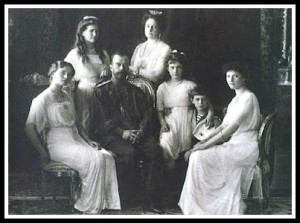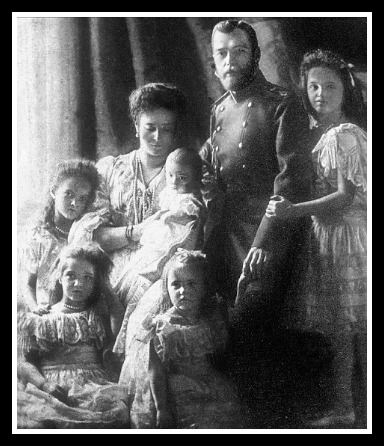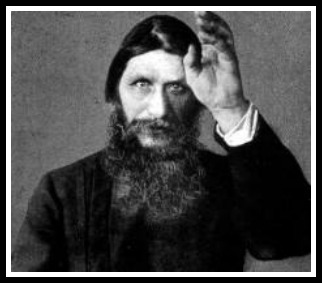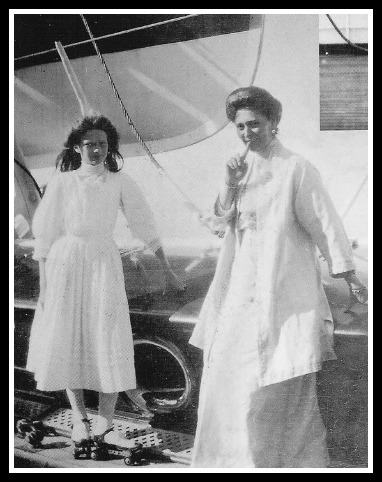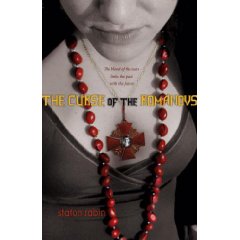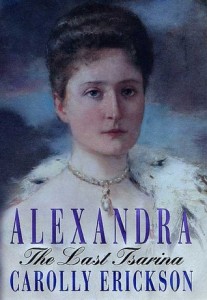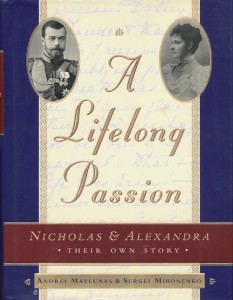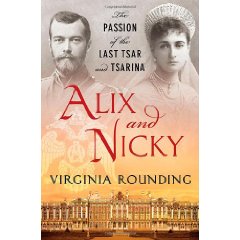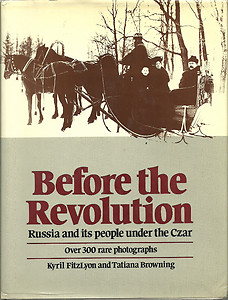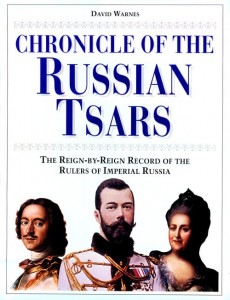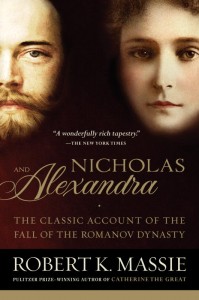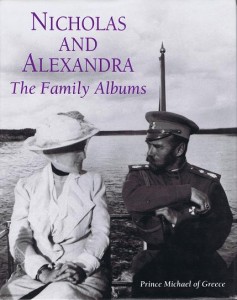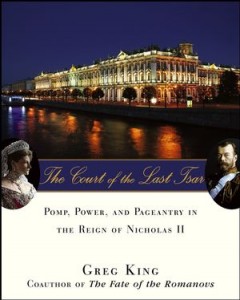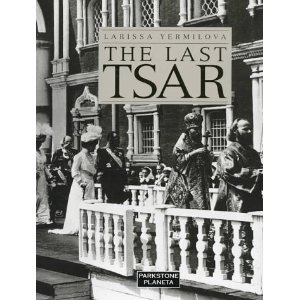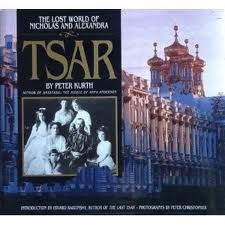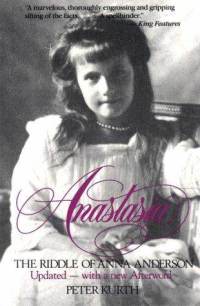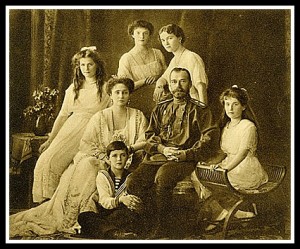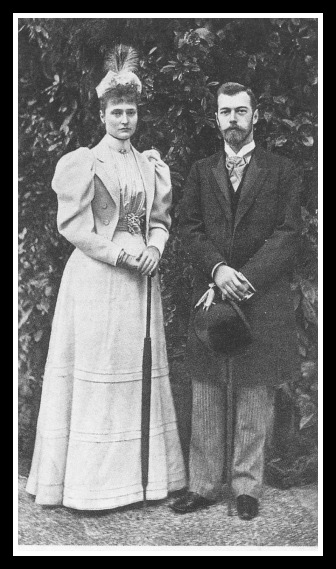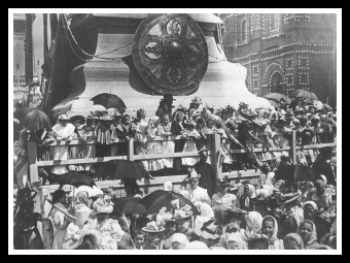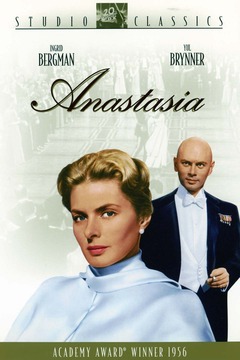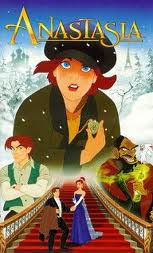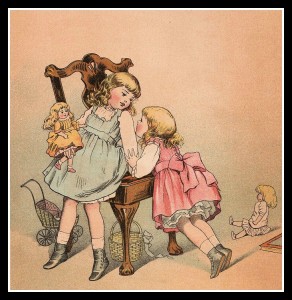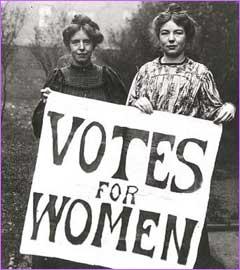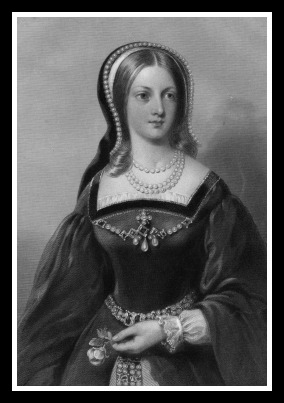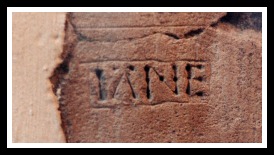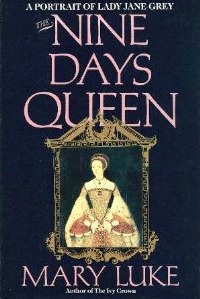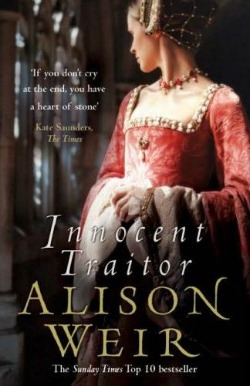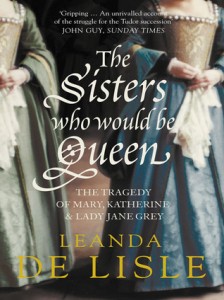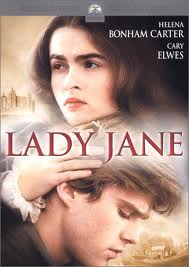Episode 33: The Romanovs, Part Two
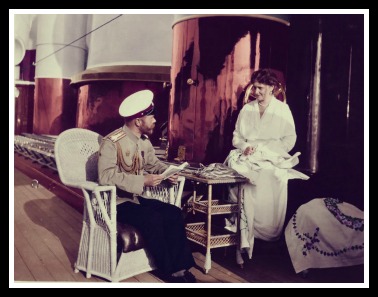
"Would you like eggs for breakfast, my Dear?" "Oh yes, but from a chicken, not a jeweler." *Insert regal laughter* Ok, made that up. But Niki and Alex being chill on the royal yacht
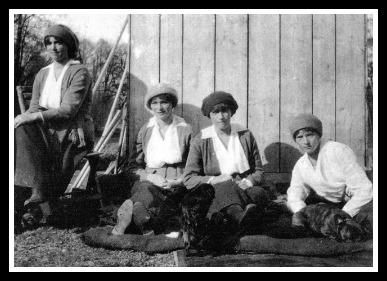
One of the last images of the Romanov sisters-Maria, Olga, Anastasia and Tatiana in captivity at Tsarskoe Selo in 1917
As always our music comes courtesty of Music Alley, visit them at music.mevio.com
Episode 32: The Romanovs Part One
Every season we let you choose a winner in our Guaranteed Content Poll. We grant that request and bring Season Three to a close with your winner- The Romanov Sisters. But, we decided to give you more than you asked for and expanded on the topic to include the entire family. What an epic subject! The story of the Romanovs begins in 1613, and doesn’t really end until 2007! More than one episode could handle, so we have broken it into two parts.
Part one begins with a Tiny Tiny Romanov Tutorial. We give a very brief history of the very long reign of this Imperial family. Beginning in 1613 when the 16 year-old nephew to Ivan the Terrible- Mikhail is crowned the first Tsar of Russia. Fast forward through time, past some Greats (and some not-so-greats) we finally land at Alexander III who we fondly call,”Papa Tsar”. He is the father of Nicholas and his death shortly after the engagement of his son to a well connected Princess begins the reign of the last Tsar, Nicholas II.
The Princess in this story was christened (deep breath) Princess Victoria Alix Helena Louise Beatrice of Hesse and by Rhine. Or Alix for short (and “Sunny” if you knew her really well).
Alix was the daughter of Alice, and Alice was the third child of Queen Victoria and Prince Albert. Not too shabby as royal lineage goes. Early in her life Alix lived up to her nickname and was sunny and happy. Then a diphtheria epidemic hit her home and Alix lost her little sister and her mother. Gan Gan Victoria did give Alix and her siblings a mother figure as often as she could while they grew up.
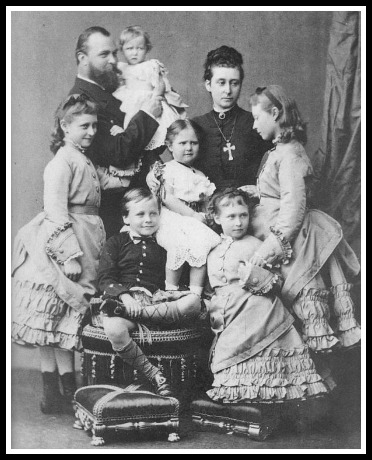
Alice and Louis and family, little Alix (in white) is leaning against her mother, looking concerned.
She also gave Alix something even less cheery and warm: Hemophilia- or rather the gene that carries it. Through her bloodline, Alix became a carrier for the bleeding disorder.
As always, we go into much more detail in the podcast, but life briefly became sunny again for her when she spent time with Nicholas. They met when he was 16, she merely 12 at Alix’s older sister Ella’s wedding. Both were smitten, however neither family was crazy about the match and tried to throw more politically adventagous suitors before both of them (as well as one that was merely designed to distract the young man). But the plots were unsuccessful and, after many years of exchanging letters, visits and flirtations, Nicholas proposed
Alix cried.
And not happy Yes! Yes! tears, either.
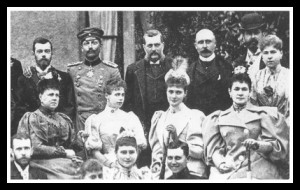
Taken at the wedding where they became engaged. Alex looking a little flirty (middle row, second from right) and Nicholas looking really uncomfortable in the arm of Cousin Willy (Kaiser Wilhelm)
She would have to leave not only her country, but also her Lutheran faith. To become part of the Imperial family, to become the next Tsarina she would have to convert to Russian Orthodoxy. After many tears, and questionably intended drama, she accepted.
Our couple would not have a leisurely engagement. Shortly after their betrothal was announced the rapidly failing health of Papa Tsar took a turn for the worse. Nicholas called Alex to be at his side as his father passed away. For more prepared future rulers, this would have been a time of sadness as well as a preparation to step up to the role that he had been trained for his whole life.
But that’s not exactly how Nicholas felt. In the shadow of his strong father, Nicholas had grown up lacking both the temperament to rule but also the training. But with his father’s death, he had to accept his role and duty to Russia.
Nicholas and Alexandra -as her name became- were wed.
Not only was Alex now in a new country with new customs and societal rules- she had some rather unique Mother-in-law issues.
Dowager Tsarina Maria was not only unwilling to give up the life she knew, it wasn’t required of her. She stood at her son’s side, as his wife walked paces behind them, continuing with her life as it had been before her husband had passed. To complicate the situation, the newlyweds had to live with her. The wedding was so rushed that no home had been set up for Nicholas and Alexandra.
Within a year the first child, Olga was born to the couple. They both loved being parents, but were also preparing for another life change: their coronation of the new Tsar and Tsarina of Russia. The religious ceremony would establish Nicholas as the head of the autocracy, and marry him to his country in what was thought of his God given position as ruler.
This happy event brought out millions of spectators and, despite the falling economy of the country, no expense was spared. Parades and balls and pagentry galore- and all went well…until a stampede of spectators eager for ceremonial swag created a deadly situation. The exact number of people that were trampled to death us unclear, but up to 3,000 people died that day. How the people saw the reaction of their new ruler played a part in what will be the legacy of his rule.
Tune back in soon for Part Two of this sad story of the last Imperial Family of Russia.
TIME TRAVEL WITH THE HISTORY CHICKS
You want more Romanovs! We get that. We did, too. There is no shortage of images, websites and blogs of this Imperial Family online. We whittled down the list to our favorites and because this is a two-part subject, we are going to link you up with everything but books here. Check back for Part Two for all of our (many) book recommendations.
You want pictures and the stories behind them? You want to tour the palaces from the comfort of your home? You want to see all those jewel encrusted Easter eggs? Click on over to Alexander Palace Time Machine to get enough Romanov intel and images to keep you occupied for a very long time.
Another really great site that has videos and tons of biographies is Royal Russia- The Romanovs.
Finally, you might enjoy checking out NicholasandAlexandra.com
The podcast that we reference in Part Two, Russian Rulers History Podcast, can be found on your favorite podcast aggregator.
Movies! Although we end this part of our tale before Anastasia is even born, she is the subject of two films that were pretty good.
We talk about it these movies and links in Part Two(which will make this link make sense) but you might enjoy checking out the Animated Things Club podcast.
And because it’s funny, here is a link to part one of the Frasier episode, A Tsar is Born.
As always, music comes courtesy of Music Alley. Visit them at Music.mevio.com
November Update
We don’t usually post about any women other than the ones that we spotlight, but make an exception every once and again. Now seems like a very good time to do that.
After we had posted our Lady Jane Grey episode we were on track to bring you the final episode of Season Three. It’s a doozie, epically complicated with a lot of players covering a very long span of time. It’s a topic you asked for, we researched and were ready to record it.
But we had also promised that we wouldn’t take a break between Season Three and Season Four- and we needed to firm up our schedule for Season Four.
So we decided to meet and do just that: select a list of ten women and get a collection of options for you to vote for in the Guaranteed Content Poll. The plan was to meet one Friday, then record three days later on a Monday. Because of where we live, our day jobs and our preference to record in the same room- we usually only have one day a week where our schedules can work together. Taking that Monday was a choice we made to put everything else aside, and get this podcast recorded.
On that Friday, the plan was working. We firmed up the upcoming season, had a lovely- and very rare- lunch together. We had a few minutes before we had to head home to pick up our kids, so we went to locate a nearby Geocache. Because we could. And it was fun. And we don’t ever have time to do goofy stuff like that together.
Then on the way home one of us came down with a pretty nasty stomach virus that wiped out the whole next week for recording.
The following week a Day Job emergency did the same.
Day job commitments, kid health issues, and our schedules kept stealing our recording days. Finally, several weeks after our Friday meeting, we sat down and recorded what will be a two-part podcast.
You may not realize what we do after we have recorded an episode. Beckett gets to editing. She takes out the parts where a truck may have driven past the House of Wood, or one of us got up to get a fresh cup of coffee, or got off on a tangent (what? It’s a conversation-sometimes that happens). Basically she takes out anything that has no relevance to the topic at hand. She adds and selects the music, and gets our very smooth voiced History Dude to record something for the middle. This takes quite a few days- and an occasional night- worth of any free time she has.
While she is doing that, Susan writes the shownotes. This doesn’t take as long as Beckett’s editing, but we have a pretty sizable portion of our audience that don’t listen to the podcast, but use the shownotes to tell them the story of the women that we spotlight. (Waves to those people) And we have to make sure that all of our recommended reading and links to places we talk about are here for you to click.
At this point we started to wonder if our episode was cursed. Things continued to happen- a death in the family that required out of town travel, a technical issue that had us contemplating re-recording… one thing after another. In the span of time that we kept crashing into obstacles, we typically could have two full episodes out. It was very frustrating.
In the middle of all of that, we were informed that YOU had nominated us for a Podcast Award! Thank you so much for that! But we hesitated to link you to the voting, before we could get the next episode up to you. It felt wrong to us.
So we were silent.
And you noticed! You sent us notes asking if we were ok and when you could expect the next podcast episode… it was really nice and made us reevaluate our communication plans.
Today, we share the tale. Quite frankly we are nervous to tell you when the next episodes will be posted. It’s a two-parter that a curse really does tie into quite well. We HOPE to have that up by the end of this week.
Hope.
Cross everything.
Send good vibes, and energy and prayers and whatever you have to offer. Because after we post those, we need to record the beginning of Season Four…and we both are really excited to do that.
If you don’t hate us for keeping you in the dark, here is a link to The Podcast Awards. We are nominated in the Education category and you can vote once a day until November 15th.
And because it’s fun, here is a link to learn more about geocashing.
Thank you for your patience and understanding!
Beckett and Susan
Episode 31:Lady Jane Grey
Often listed as merely an asterisk in history, Lady Jane Grey did have a part in the tale of the Tudors and in the succession of the crown. A teeeny tiny part, but a part nonetheless. Her young life and limited time on the throne may have been short, but it was long on drama. Did she end up remembered as the Nine Day Queen because of manipulation and lust for power? Whose? Was she a puppet or did she know what she was doing? The brief life and rule of this teenage royal is worth a bit of a chat, don’t you think? We did.
Jane Grey was born in October of 1537 (or perhaps in 1536) to Lord Henry and Lady Frances Grey. If you like a little title with your history, that would be the Marquees of Dorset and Frances Brandon, niece to King Henry VIII. Frances’ mother was Mary- the sister of Henry- and her father was Charles Brandon, Duke of Suffolk and life long frat bro of Henry. Later, after his and Frances’ brothers’ deaths, Frances would inherit the titles and she and Henry would become the Duke and Duchess of Suffolk .
Jane was also born about the same time as her cousin Prince Edward, son of Henry VIII. Linking Edward to Jane was an easy move on the part of her parents. Cousins marrying was far from unheard of, and Jane was raised with this goal in mind. To add a little more incentive to the mix – as the only son of the king, Edward was next in line to the throne. They had so much in common- Edward was was raised Protestant- just like Jane. If you have paid any attention to our ongoing Tudors series (and you should, it’s very interesting) religion plays a big part in the story. (And we always explain more in our podcast than in these notes).
Jane and her sisters Katherine and Mary (yes, we have heard those names before) were educated at home, taught to read Latin, Greek, French, Italian and groomed for well placed marriages that would bring the family more power. At nine, Jane’s guardianship was given to Katherine Parr, the then-wife of Henry VIII. Upon his death, and Katherine’s subsequent marriage to Thomas Seymour (we cover this in the Four Wives podcast) Jane’s wardship was turned over to the Seymours. Why? Because it was thought that this was the best way to arrange a marriage between Jane the new king, Edward VI- a marriage that would suit all parties involved.
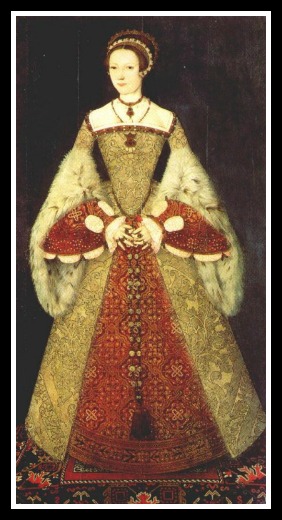
This portrait is often cited as being of Jane Grey, but there is much dispute that it is, in fact, of Katherine Parr. Actually, a great number of portraits that were believed to be Jane were proven to be someone else. Rather than be frustrated,we think it's fun to watch what we think was known reveal itself to be something else entirely. It's like a game!
But Katherine died in childbirth a short time later. And Thomas followed her to death when he was executed a year after that. Jane’s guardianship was up for grabs again, and who better to secure her future as queen than the chief counselor to King Edward, John Dudley, the Duke of Northumberland.
Dudley was a very powerful man in a sweet position, who wanted to remain that way. He knew that if Edward produced an heir, Edward’s sisters, Mary or Elizabeth, would not rule, toss him out…or worse. But if he could marry Jane to the king- who was also in line to the throne (via her mother who was willing to let it pass to Jane) he might just be able to hold onto all that was near and dear to him. Like his head.
But his plan was flawed. Edward became very ill and it was clear he would not live to marry, let alone produce an heir.
So in a swift coordinated effort with Jane’s parent’s-Dudley married 15 year-old Jane off to his only marriageable son, Guilford. It was a hot mess of a wedding that also married off his daughter and one of Jane’s sisters to well-placed men. When Edward died very shortly afterward, Dudley did a fancy dance of deceit – badda bing, Jane is Queen. Everyone is happy.
Except just about everyone who wasn’t related to Jane. The people were scratching their heads, “Queen Who?”
Except Jane who never wanted to be Queen and was frightfully unprepared for the position.
Oh, yeah, and except for Mary who foiled a plot of Dudley’s to have her thrown in the Tower of London and knew that it was her turn to rule. Mary knew that she was entitled to the crown, and she had the support of the people behind her (We do cover all of this time in the Mary I podcast).
For nine days Jane was Queen Jane. And then Mary took care of that.
Mary tossed Jane and Guilford in the tower, where they remained for several months. It wasn’t horrible living conditions, but it was imprisonment. Rumor has it that this tribute, in the Beauchamp Tower, was carved for his wife by Guilford himself . This humanizes him a bit ( which his legacy totally needs).
At first, Mary did not want to execute them. However, an ill-fated attempt to over-throw Mary -led by Jane’s own father- made Mary think that this decision was necessary.
On February 12, 1554, less than a year after being imprisoned, Lady Jane Grey and her husband Guilford were beheaded.

The Execution of Lady Jane Grey by, Paul Delarouche (This one we know is her, her name is in the title)
TIME TRAVEL WITH THE HISTORY CHICKS
An website with an easy read of her life, Ladyjanegrey.org .
Or this one with a very lengthy description, as well as some links to outside sources (although not all the links are currently functioning) EnglishHistory.net .
And finally, a really thorough one about all things Tudor, Tudorhistory.org
Want to travel around through the Tower of London (and other historic places of England?) not exactly like being there, but much simpler. HistoricRoyalPalaces.org
Ooh, an internet museum? Love that, lots of clicking to do on this one, although it doesn’t look like it has been updated recently. But really, unless there is new information, that’s not entirely necessary, right? Lady Jane Grey Internet Museum
Tweet what, you say? We love it when we find an active twitter for one of our women- Lady Jane Grey Info.
Of course we have some book recommendations, have you just met us?
And a movie, that isn’t exactly historically accurate (are any of them?) and we dare you not to have Princess Bride quotes running in your head if you watch it!
Shownotes: Episode 30 – Queen Mary I
Before she became the first Queen Regnant of England, before she was labeled illegitimate, she was, quite simply, Princess Mary of England – the apple of her father’s eye. But, ahh, nothing is simple for those Tudors. Nothing.
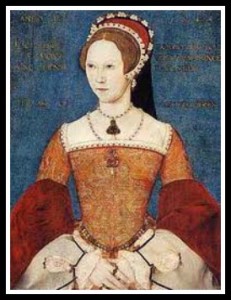
We discussed the early life of Mary Tudor in the Catherine of Aragon podcast-you might want to check that one out first. In a nut shell (and we use that term pretty accurately): Henry Tudor married a Spanish princess, Catherine of Aragon, who just happened to be the widow of his dead brother. Catherine had several pregnancies, but only one child survived birth and infancy: Mary, who was born on February 18, 1516. Henry, desperate for a male heir and thinking that another wife could bring him that, went to extremes to sever his ties with Catherine.
But before he did, Mary was his ” pearl in the kingdom”. He doted on her and set her up like the princess that she technically was. She was raised royal- finest of everything and traveled from one estate to the next with her entourage. But the Princess life Mary knew ended with her parents marriage. Her new step-mom had it out for her, more so once a step-sister, Elizabeth, entered the world.

But Step-Mummy Dearest couldn’t produce that male heir, so Daddy ended that marriage faster than the first. Step-Mom #2 was kind to Mary and gave her a little brother but she died from complications of childbirth. Mary got along well enough with #3, but that marriage didn’t stick and #3 was transformed into an Aunt. Step-monster #4 wasn’t around long enough for Mary’s distaste of her to cause too much trouble, and Step Mother #5 was the fairest, and kindest of them all and saw Daddy King to his death. With that, Mary’s ride on the Step-Momcoaster came to a complete stop. Little brother Edward became King, and Mary set off to a well provisioned life. (See our podcast and shownotes from Episode 24: Last Four Wives for more details about this time.)
Mary had inherited quite a bit from both of her parents. From her mother she had her deep Catholic faith, and a stubborn streak that helped her hold her ground. From her father she had gained great wealth, much land…and a stubborn streak. During Henry’s life Mary and he had many years where the two battled with stubborn and manipulative weaponry. After his death, she put those tools away during her brother’s reign.
And then he died. King Edward VI ruled for only six years and died at the age of 15. Because of his young age, a Regency Counsel made most of the decisions for him in regard to ruling. A Counsel made of men. Some of those men with ambition and drive and lust for power. As with everything, we do go into detail in the podcast about all of this and sum it up here: upon Edward’s death there was some confusion as to who would succeed him. Henry VIII had mapped out the line in his will-Mary would be next. But members of the Counsel schemed a way around that, and for a very brief time that person was determined to be Lady Jane Grey.
Mary was having none of this. She whipped her royal blood into a well executed bid for the crown, and won. (This is the extremely abridged version).
At the age of 37 Queen Mary I was crowned.
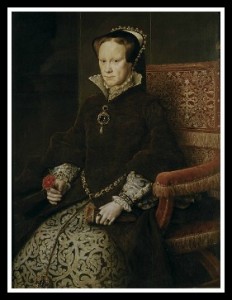
First up on her To-Do list: Convert England and her realm back to Roman Catholicism. Papa and Brother King had allowed Protestant faith to become the official religion, but Mary was a very serious Catholic. She had a few hurdles in the way but worked with Parliament to make it so, (number one…get it?) She ultimately threw her royal weight around and enforced heresy laws which allowed those practicing religion other than, and speaking out against the religion of the land to be executed. Specifically, burned at the stake.
It’s not a pretty time in history. Despite the nickname that would follow her through time- Bloody Mary- it wasn’t the first time this law had been practiced. Her own father and brother had also executed many for similar religious reasons. (And don’t get us started on what her Spanish grandparents did.)
Also up on Mary’s list: Find a husband and produce an heir. She checked off the former with Prince Phillip II of Spain, but the latter was never to be. She had two phantom pregnancies and never had a child.
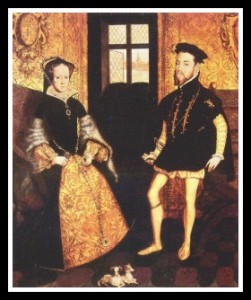
Mary ruled for five years. In that time she had a complicated relationship with her half-sister and next in line for the throne, Elizabeth. Her relationship with her husband was also strained- he didn’t seem to be in it for more than political gain, and she was unable to provide an heir. By the end of her life, he was living and ruling in Spain and their time together had been minimal at best.
Mary died at the age of 42, and Elizabeth I was crowned. Mary’s original tomb was ruined over time. When Elizabeth died, James I buried both sisters together in the same tomb and that is where they lie now. With an effigy of ELIZABETH atop them both.
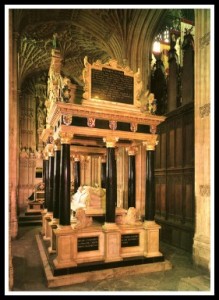
Time Travel With The History Chicks
Want to get a Mary I ditty stuck in your head? Horrible Histories has one for you.
Good site for middle grades (or a quick read ) and LOTS of extras to click on: Tudorhistory.org.
Of course there is the Showtime series, The Tudors where Mary’s story is shown with a heavy hand for the dramatic, not quite historically accurate but always riveting. If you are a fan, or want to discuss it, check out TheTudorsWiki.com
Books! We know you love your books and these are the ones that we recommended during the podcast:
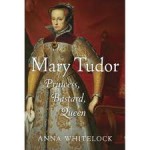


Just because we can: Like Mary’s mug? At this writing Seaway China Company is sold out, but maybe you can find one of these Royal Doulton mugs to use at work. Especially handy if you have the unpleasant task of firing someone. (Royal Doulton has an entire line of Royal mugs like this.)
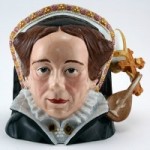
You might want to research the origins of some of your favorite nursery rhymes. Mary, Mary Quite Contrary has a little debate surrounding it. Was it about Mary Tudor, or her Aunt Mary Queen of Scots? You decide. Mother Goose Club has a lot of info or Secret Rhyme Origins has a bit, too.
As always, our music comes courtesty of MusicAlley. Visit them at Music.mevio.com
